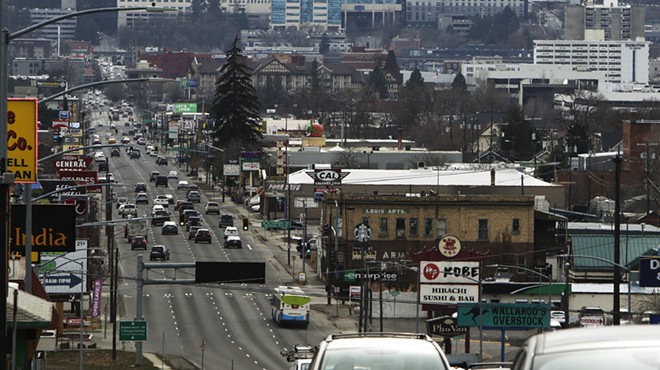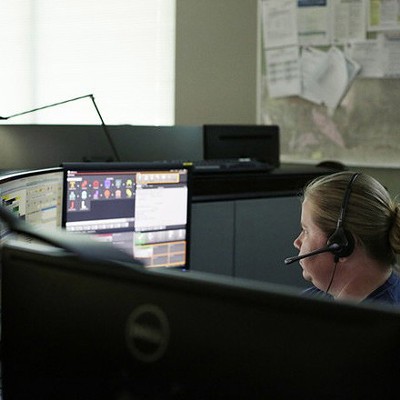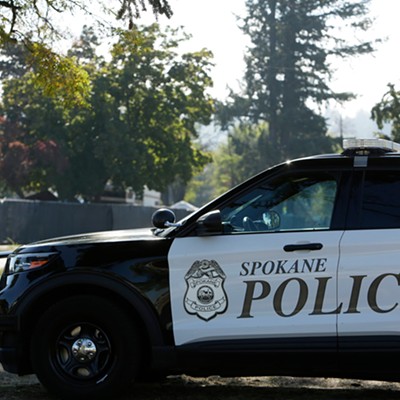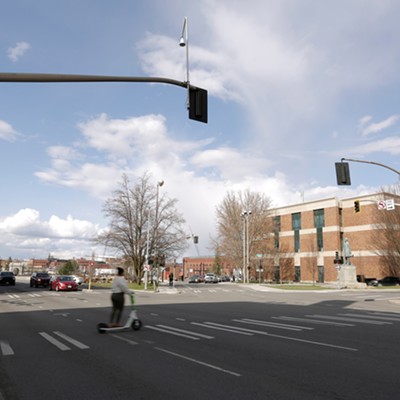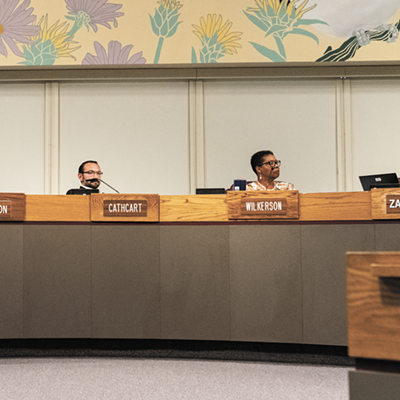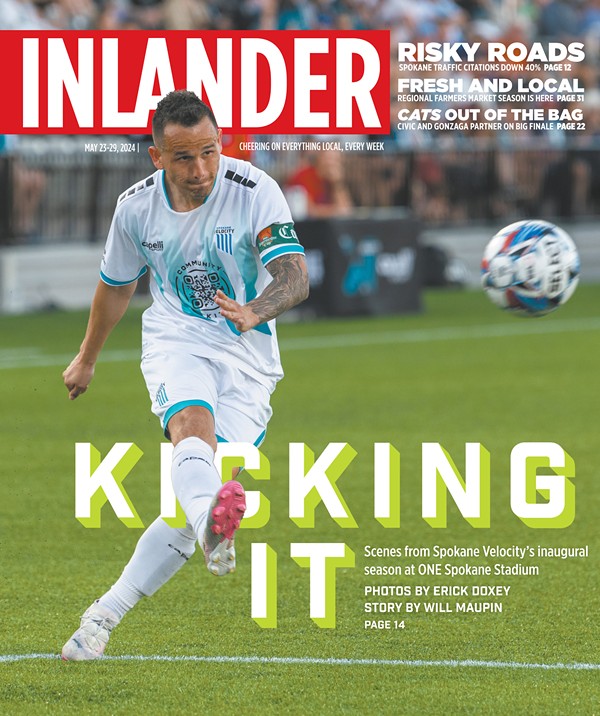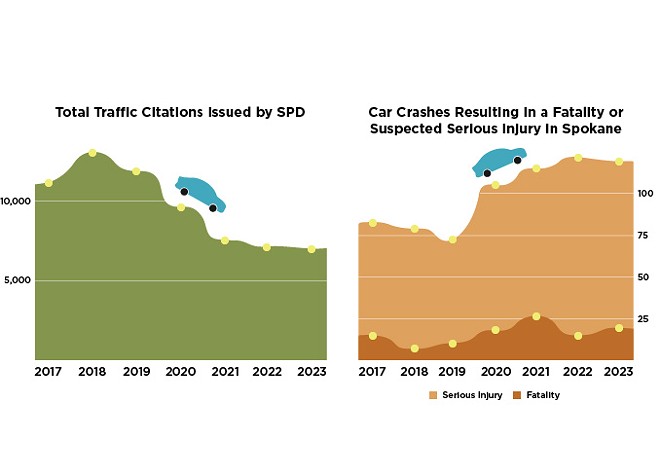
It's not just your imagination: Reckless Spokane drivers aren't getting in as much trouble as they used to.
Between 2017 and 2019, Spokane police issued an average of 11,991 traffic citations per year, according to data the Inlander obtained via public records request. The number started to fall during the pandemic, and last year police issued just 7,163 traffic citations — a 40% decrease compared with the three-year, pre-pandemic average.
The decline in traffic enforcement has coincided with an uptick in drivers killing and seriously injuring people in Spokane.
Last year, car crashes inside Spokane city limits killed 19 people and caused 102 suspected serious injuries, according to Washington State Department of Transportation data. That's a 54% increase compared with the three-year, pre-pandemic average of 10 deaths and 68 serious injuries per year.
Interim Spokane Police Chief Justin Lundgren says traffic enforcement has dropped in recent years because of "pervasive" staffing shortages and a large increase in emergency calls.
"We had to pull resources into patrol to be able to handle those emergency calls for service and make sure that we have enough staffing and officers in the field to be able to respond when people call for help," Lundgren says. "That has impacted our ability to do as much traffic enforcement as we would like."
Spokane's decrease in citations — and the uptick in deaths and serious injuries — mirrors a statewide trend. Since the onset of the pandemic, traffic deaths across Washington have skyrocketed. Last year was Washington's deadliest year since 1990, with 810 people killed in vehicle crashes, according to a report released by the Washington Traffic Safety Commission last week.
A decline in traffic enforcement across the state could be a key factor, says Mark McKechnie, a spokesperson with the state Traffic Safety Commission.
"People have noticed that enforcement is down. They feel like they and others are less likely to be stopped," McKechnie says. "That probably leads to more lawbreaking, and more high-risk behaviors if people think the chances of getting caught are less."
'PERFECT STORM'
When the pandemic first hit, many police departments eased up on traffic stops to limit contact with the public, McKechnie says. In 2020, 473,084 traffic citations were filed with Washington courts, compared with an annual average of 718,529 in the three years prior.Even as the nature of how the virus spread became better understood, enforcement continued to wane. Many departments struggled with serious staffing shortages. There was also an uptick in violent crime, which saw many officers pulled away from traffic enforcement, McKechnie says. As the number of fatal crashes rose, many officers were also pulled away to do investigations, which further limited their ability to do proactive enforcement.
"It's kind of a perfect storm. Lower staffing, increasing crime and increasing fatal crashes were all drawing from the same limited pool of resources," McKechnie says.
The number of statewide citations fell to about 364,000 in 2021, and about 347,000 in 2022. The number rebounded slightly last year, but is still significantly lower than it was before 2020.
"The factors that lead to a traffic fatality are complicated, it's usually not just one thing. But it's also hard to ignore that enforcement went down so significantly at the same time that our fatalities went up," McKechnie says. "We assume there has to be a relationship."
But even before the pandemic, traffic deaths in America had been steadily rising. Researchers have pointed to decades of car-centric infrastructure, increasingly large cars and smartphones as possible culprits.
Some states have seen slight decreases in traffic fatalities over the past two years, but deaths in Washington continue to rise. The fact that Washington has the lowest number of law enforcement officers per capita may be one factor, McKechnie says.
DEDICATED TRAFFIC UNIT
The Spokane Police Department used to have a five-person unit that was solely dedicated to traffic enforcement. The unit was eliminated in 2021 due to staffing shortages, and the officers were moved to patrol.The unit was briefly brought back in April 2022, but sometimes those officers would be reassigned to patrol for days or a week because of staffing shortages, Lundgren says. The unit was fully disbanded again in January 2023 as part of a larger reconfiguration.
Even without a dedicated traffic unit, patrol officers in Spokane continue to make stops and write tickets when they have time in between calls, and the department will sometimes do special emphasis patrols during high-traffic weekends, Lundgren says.
Precinct captains will also sometimes assign officers to take a shift solely dedicated to traffic enforcement — but that can only happen when their team is adequately staffed, Lundgren says. Emergency calls need to be prioritized.
The department is authorized for 352 commissioned officers. But Lundgren says there are currently four vacancies, 11 officers unable to work because of injuries or other reasons, and 21 who are in some stage of training.
"That's about 10% of our workforce that we're not able to use at this time," Lundgren says.
Staffing will improve somewhat when the officers complete training in coming months, he says, but he also acknowledges that the department will have to find ways to trim expenses as the city struggles with a $25 million budget deficit.
Last fall, former Mayor Nadine Woodward identified bringing back the department's traffic unit as a major priority. Her 2024 budget allocated $1.8 million from the city's traffic calming fund — which collects money from automatic traffic camera tickets — to restart the unit.
But Lundgren says the traffic unit hasn't restarted yet because of staffing shortages.
"We're just not in a position to be able to have that standalone unit whether the money exists or not, the real issue is the staffing," Lundgren says.
Spokane's decline in traffic citations has correlated with a drop in revenue. Traffic infractions issued by officers brought in $1.1 million in 2018, and just $379,672 in 2022, according to a budget presentation last year.
Woodward's 2024 budget anticipated that $700,000 would be brought in from the restarted traffic unit. The current pace of traffic citations issued this year makes that unlikely.
In the first four months of 2024, police issued 2,360 traffic citations. If the pace remains the same for the rest of the year, they'll end with 7,080 citations — slightly less than the total number issued in 2023.
Lundgren is hopeful that the traffic unit can be restarted once the department's staffing problems are addressed.
"There's quantifiable research that shows, as we increase the level of traffic enforcement, there is a positive net effect on serious collisions," Lundgren says. "We'd love to get back to having a dedicated unit." ♦



